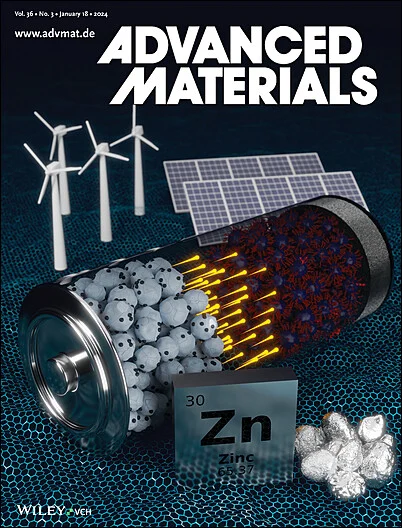DNA -支架双特异性抗体增强间充质间质细胞治疗炎症性肠病
IF 26.8
1区 材料科学
Q1 CHEMISTRY, MULTIDISCIPLINARY
引用次数: 0
摘要
间充质基质细胞(MSCs)由于其强大的免疫调节特性和强大的再生潜力,被认为是一种很有前途的炎症性肠病(IBD)细胞治疗方法。然而,它们对IBD的治疗效果受到归巢能力差和炎症结肠部位白细胞浸润过多的阻碍。在这项研究中,通过DNA纳米技术组装具有Y形双特异性抗体(YMV)的间充质干细胞,该抗体整合了抗血管细胞粘附分子- 1 (anti - VCAM - 1)和抗粘膜寻址细胞粘附分子- 1 (anti - MAdCAM - 1)抗体,以增强靶向递送和抑制白细胞募集。与天然MSCs相比,YMV修饰的MSCs的粘附效率提高了大约三倍。值得注意的是,它们有效地竞争MAdCAM‐1结合位点,并显著抑制白细胞粘附。在IBD小鼠模型中,YMV - MSCs显示出增强的结肠归巢,促进粘膜修复,减少白细胞浸润,并减轻局部炎症。这种DNA介导的双特异性抗体修饰策略通过阻断白细胞募集来提高MSCs的靶向性并发挥抗炎作用,为基于MSC的治疗提供了一个有希望的平台。本文章由计算机程序翻译,如有差异,请以英文原文为准。
DNA‐Scaffolded Bispecific Antibodies Enhance Mesenchymal Stromal Cell Therapy for Inflammatory Bowel Disease
Mesenchymal stromal cells (MSCs) are considered a promising cell‐based therapy for inflammatory bowel disease (IBD), due to their potent immunomodulatory properties and robust regenerative potential. However, their therapeutic efficacy against IBD is hindered by poor homing capacity and excessive leukocyte infiltration at inflamed colonic sites. In this study, MSCs with a Y‐shaped bispecific antibody (YMV) assembled via DNA nanotechnology, which integrates anti‐vascular cell adhesion molecule‐1 (anti‐VCAM‐1) and anti‐mucosal addressing cell adhesion molecules‐1 (anti‐MAdCAM‐1) antibodies are engineered, to enhance targeted delivery and inhibit leukocyte recruitment. YMV‐modified MSCs show an approximately threefold enhancement in adhesion efficiency compared with native MSCs. Notably, they effectively compete for MAdCAM‐1 binding sites and significantly suppress leukocyte adhesion. In a mouse model of IBD, YMV‐MSCs demonstrate enhanced homing to the colon, promote mucosal repair, reduce leukocyte infiltration, and attenuate local inflammation. This DNA‐mediated bispecific antibody modification strategy improves MSCs targeting and exerts anti‐inflammatory effects by blocking leukocyte recruitment, offering a promising platform for MSC‐based therapy.
求助全文
通过发布文献求助,成功后即可免费获取论文全文。
去求助
来源期刊

Advanced Materials
工程技术-材料科学:综合
CiteScore
43.00
自引率
4.10%
发文量
2182
审稿时长
2 months
期刊介绍:
Advanced Materials, one of the world's most prestigious journals and the foundation of the Advanced portfolio, is the home of choice for best-in-class materials science for more than 30 years. Following this fast-growing and interdisciplinary field, we are considering and publishing the most important discoveries on any and all materials from materials scientists, chemists, physicists, engineers as well as health and life scientists and bringing you the latest results and trends in modern materials-related research every week.
 求助内容:
求助内容: 应助结果提醒方式:
应助结果提醒方式:


